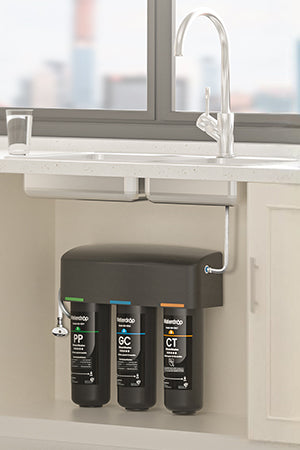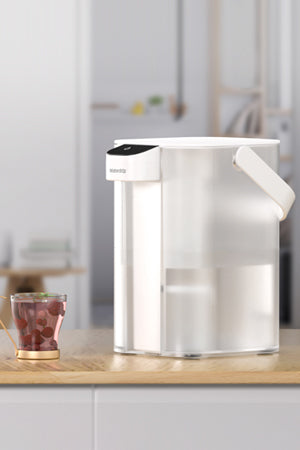We take clean water for granted but questions about its safety never really go away. One of the most common questions people ask is if filtered water is safe to drink without boiling it first. With so many water filtration systems out there — from simple pitchers to advanced
reverse osmosis (RO) filters — it's natural to wonder if extra steps like boiling are still needed.
Why Do We Treat Drinking Water in the First Place?
Before we get into whether filtered water is safe without boiling, let's talk about why water treatment matters. Municipal water supplies in Singapore are generally safe but contaminants can still get in. Common issues are:
- Microorganisms like bacteria, viruses and parasites
- Heavy metals like lead, arsenic and mercury
- Chemical pollutants from agriculture or industry
- Sediment and rust from old pipes
- Chlorine and chloramine added for disinfection
Drinking untreated or poorly treated water can cause stomach upset, long term health issues or even waterborne diseases.
Do I Need to Boil Filtered Water?
This is the big question: if you already use a water filter, do you need to boil it? The answer depends on two main factors: the quality of your water source and the type of filter you use.
When You Don't Need to Boil Filtered Water
If your filter is certified to remove harmful contaminants — especially a
reverse osmosis (RO) system or a filter with
NSF/ANSI certification — you usually don't need to boil it. These systems are designed to:
- Remove bacteria and viruses
- Eliminate heavy metals
- Reduce chlorine, chemicals and bad taste
- Provide safe drinking water straight from the tap
For households in developed countries with reliable municipal supplies, filtered water from a high quality filter is usually safe without boiling.
When You Might Still Need to Boil Filtered Water
There are situations where boiling water after filtering can provide an extra layer of protection:
During Boil Water Advisories
If local authorities issue a warning due to contamination, it's safer to boil even filtered water.
After Floods or Natural Disasters
Filtration systems may not be able to handle severe contamination from sewage or chemicals.With basic filters: Pitcher filters or faucet-mounted filters may not remove microorganisms. Boil if unsure.
What's the Difference Between Boiling and Filtering Water?
Both methods make water safe but they work differently.
Boiling Water
How it works: Heating water to at least 100°C (212°F) kills most bacteria, viruses and parasites.
- Pros: Effective against microorganisms; simple and cheap.
- Cons: Doesn't remove chemicals, heavy metals or sediment; uses energy; water may taste flat.
Filtering Water
How it works: A filter passes water through materials (carbon, membranes or resin) to remove specific contaminants.
- Pros: Removes chlorine, chemicals and sometimes microorganisms; improves taste; convenient for daily use.
- Cons: Not all filters are equal — some don't remove pathogens; filters need replacement.
Which is Better for Daily Drinking — Boiled or Filtered Water?
For everyday hydration, filtered water is usually the better choice. It's faster, more convenient and handles a wider range of contaminants. Boiling is good for emergencies or when the water quality is uncertain.
The best option is often a combination of filtration and boiling — filter first, then boil if there's a specific contamination risk. This is common in areas with unreliable tap water.
Can I Drink Tap Water Directly Without Filtering or Boiling?
In countries with strict water regulations like the US and Singapore, tap water is generally safe to drink. However, many people still filter it because:
- Concerns about chlorine or chemical taste
- Old pipes leaching lead or rust
- Sensitivity to trace contaminants
So while it may be safe, filtering gives peace of mind and better taste.
What Happens If I Only Boil but Don't Filter Water?
Boiling makes water microbiologically safe but it won't remove chemicals or heavy metals. For example, lead or pesticide residues will remain in boiled water. That's why boiling alone is not enough in areas with chemical contamination.
What Happens If I Only Filter but Don't Boil Water?
If your filter removes microorganisms (e.g. reverse osmosis or UV systems), then you don't need to boil. But if your filter is a simple carbon filter, it may only improve taste and smell, not safety.
Do I Need to Boil Water if I Have a Reverse Osmosis System?
Reverse osmosis systems remove up to 99% of contaminants, including microorganisms, so the water is safe to drink without boiling. For households that want the safest option, an RO system gives you convenience and security.
If you're using a certified water filter — particularly advanced options like reverse osmosis (RO) systems — and your local tap water is already treated and generally safe, you don't need to boil it again. These filtration systems are designed to remove a wide range of contaminants, including bacteria, heavy metals, and chemicals, making the water safe and pleasant to drink.
However, there are times when boiling filtered water is still a good idea. During boil water advisories, natural disasters, or any situation where your water source may be compromised, boiling provides an extra safeguard. If your filter is a basic one that only improves taste and odor without removing microorganisms, boiling is recommended to ensure safety.
Conclusion
Filtered water without boiling is safe most of the time — especially with advanced filtration technologies. Boiling is a tried-and-true method but can't address all modern contaminants. For households that want safe, clean and great-tasting water, a high-quality water filter is the way to go.




































































